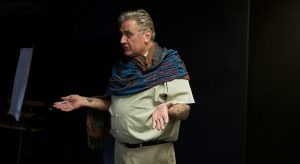Handicapping the Fringe
Just when the San Diego International Fringe Festival seems like it’s becoming predictable it slides off in yet another direction, confounding expectations. Performances seen on Sunday, June 25, and Monday, June 26, represent both the predictability and the confounding that makes the Fringe an almost-magical experience.
The predictability first: there will always be a plethora of solo performances. Some will be striking, generally by confounding expectations in some way (see below), while others will be amateurish or troubling. And, there will be some performances where the artists secured a festival slot but either didn’t prepare properly or use it to try out material that the performer knows isn’t ready for an audience.
Filling these criteria quite well is the San Luis Rey theatre collective A Stage of Our Own. Imagine a group of college-age students who are encountering Shakespeare for the first time, specifically the Bard’s wonderful and wise comedy, Twelfth Night. The group decides to do an abbreviated version of the play, titled Twelve Nights with Viola and Olivia, including a tagged-on political “epilogue.” Fair enough, so far. But, most of the performers carried scripts, garbled the text, and seemed confused about the order scenes were to be presented. If you are the kind of person who likes to cheer on young performers for just getting up and facing an audience, I recommend this entry to you. If you might wander in hoping for some insight on or fun with Shakespeare, I sat through this one so that you don’t have to.
A more intriguing example is Jim Sea’s one-person performance, Unredeemable. Mr. Sea has a serious and compelling topic: how sexual abuse begets sexual abuse. He uses a case study of a young man who has been imprisoned for sexually abusing college-age women. The young man’s social worker has encountered difficulty getting him to break through his own abuse as a means of understanding how this cycle of abuse has perpetuated itself. She approaches a bureaucrat about permission to enroll her client in a program she thinks might help, but the bureaucrat resists.
Mr. Sea is more of an advocate than a performer. He has a point of view on the case, and it is one with which many would agree (though, some would not). He portrays the three individuals by showing pictures of them (though, I doubt that the pictures were of the real people involved), and then performing what each had to say. His text is not prurient, but it is difficult to hear (and, to his credit he warns the audience and says he won’t mind if someone decides to leave). What is mostly a lack of drama may allow audiences to keep enough emotional distance to stay to the end. The depiction of the break-through, however, involves a standard therapeutic practice, and I wondered why there was so much sturm und drang needed to get the young man to that point.
Sometimes, a performance can confound expectations simply by being excellent. Emil Guillermo knows how to tell a story, and that ability sets his Amok Monologues: Short History of an American Filipino (NPR, Harvard, and a Murder on Mission) above other solo shows presented at the Fringe.
Mr. Guillermo (whose name is NOT pronounced as one might in Spanish), grew up the son of immigrant parents. As his title implies, he graduated from Harvard and worked for a time on-air at NPR. His story describes in detail his experiences and the twists and turns his life has taken up to now. It’s a familiar story in many ways, but Mr. Guillermo’s career as a journalist and his skill as a performer make it a compelling one. As someone used to working to precise timing, Mr. Guillermo takes up every bit of the hour he’s allotted. To do so, though, he departs from his own story toward the end to tell the story of a family member who didn’t have his good fortune. While I sympathize with the situation Mr. Guillermo portrayed, I wasn’t clear on how this departure related to the rest of the monologue. Nevertheless, The Amok Monologues is one of those Fringe gems audiences are glad to find.
Two other presentations provided excellence by being different. The one that is still running (tonight, 7:30, World Beat Cultural Center in Balboa Park) is Allergic to Love: Curse of the 80s. New Zealander Tom Knowles and his 80s hair band take apart Shakespeare’s Romeo and Juliet to tell a tale of being cursed to sing ballads from that era whenever one thinks of love. The music and lyrics aren’t half bad (and, if you like your music loud, this group will oblige you). There’s audience participation, and the World Beat venue is an excellent, albeit out-of-the-way setting for what is essentially a rock concert with enough of a story to qualify it as theatre. I’d catch the last show if you can.
The concert-as-theatre piece that only ran last weekend was Bodhi Tree Concerts’ 8 Songs for a Mad King. My colleague, Ken Herman, has already written a beautiful review of this concert (click on the link to read it). From my point of view, the theatricality of the piece was heightened by the location, the use of the long table as a runway for the singer to perform within touching distance of much of the audience, and the opportunity for the audience to provide the humor, via a private Twitter feed where one could be anonymous and which would disappear following the performance. The political aspects of the presentation (achieved through costuming and through what were probably fake Presidential tweets) spurred the audience to keep the humorous comments coming. Congratulations to stage director Kim Strassburger and her compatriots for their contributions to what was undoubtedly the best Fringe production of the several staged by Bodhi Tree Concerts.
[box]Twelve Nights with Viola and Olivia performs Thursday at 9pm and Saturday at 12:30pm at the basement Rosewood Five venue on Seventh Avenue. Unredeemable performs Saturday at 10:30pm and Sunday at 1:00pm on the Spreckels Theatre Stage. Amok Monologues performs Thursday at 10:30pm in the San Diego Art Institute’s Project Space on Level 2 of Horton Plaza. Allergic to Love has no performances on Wednesday or later, and 8 Songs for a Mad King closed last Sunday.[/box]








Thank you, sir, for coming to see our production of “Twelve Nights with Viola & Olivia.” Our workshop production does, indeed, reflect the slight resources–including rehearsal space and time–we had to produce a complicated play. That said, one might have mentioned that the script confronts many issues that literary critics have raised about gender and sexuality–including homosexuality–since Jeanette Foster (“Sex-Variant Women in Literature) in 1956, George Bernard Shaw in the 19th century and even Samuel Johnson in the 18th century. Moreover, unlike, say “Rosencrantz & Guildenstern are Dead” by Tom Stoppard, “Twelve Nights” does the whole thing in page after page of original Elizabethan-styled verse.
The depth of research behind “Twelve Nights” is illustrated in my 2005 thesis for my M.S. in Women’s Studies, “Exploring the Genealogy of Proto-Lesbian Desire in Britain through Shakespeare’s Twelfth Night and a Contemporary Adaptation.” Email [email protected] to request my thesis in PDF format.
This special Fringe-length version of “Twelve Nights” will be performed one more time on Saturday, at 2:30 p.m. at Rosewood Five Studios, 1150 7th Ave., downtown San Diego.